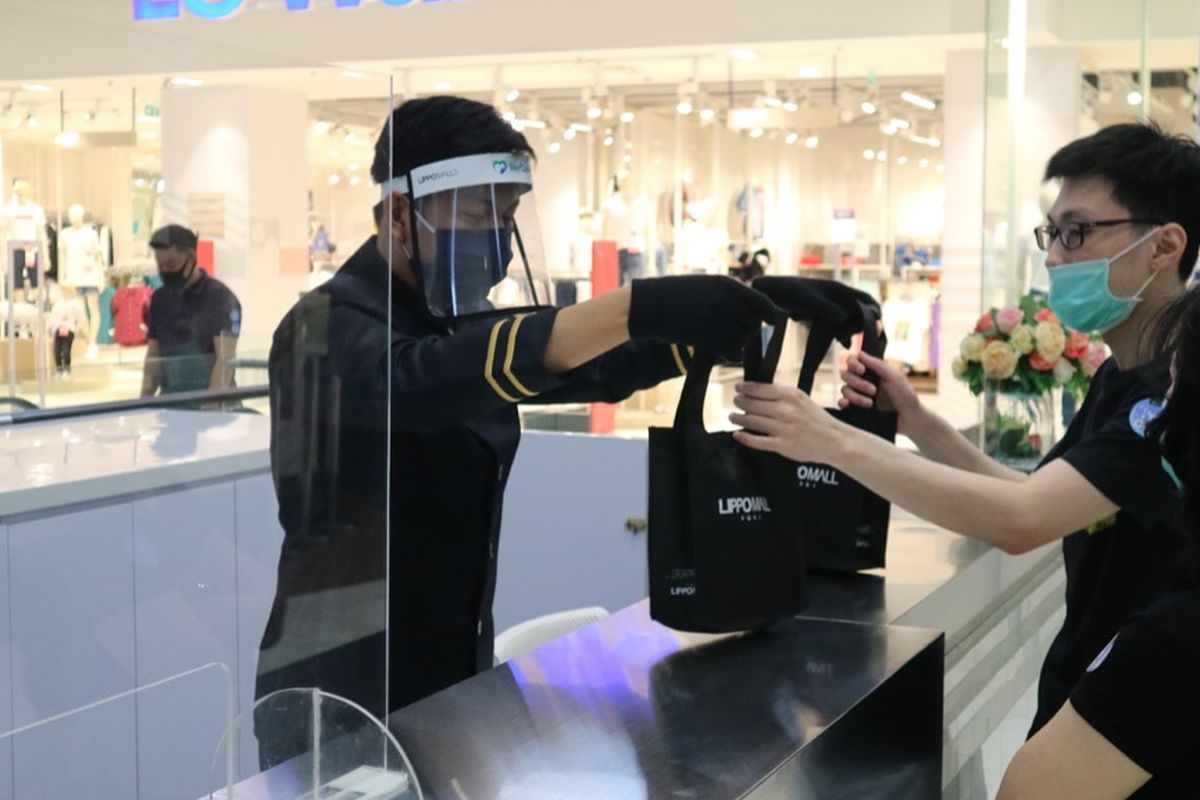Here’s What the Mall Might Look Like under Strict Health Protocols in Indonesia

JAKARTA, KOMPAS.com – Your shopping experience when going back to the mall might not be the same again.
After about three months of temporary closure due to the novel coronavirus, major malls in Indonesia’s big cities, mostly in Java Provinces where confirmed cases are high, have begun reopening.
The government’s decision to allow the retail industry back on its feet is well received by mall owners, retailers, and restaurant operators during the sluggish economy. But strict health protocols are applied now for visitors and retailers to feel safe.
Don’t be surprised when you come across more police officers and military personnel at the mall as they have to ensure not only the security of the people but also compliance with the health protocols during the Covid-19 pandemic.
Besides the usual layers of security check when entering the mall premises, guards also take temperature readings of visitors and employees. Make sure your mask is on, too.
Also read: Going For A Coffee Under New Normal Rules in Indonesia
The strict health protocols are not only for visitors to observe. Mall operators are also required to routinely spray disinfectant in all areas, provide hand sanitizers, and ensure all physical distancing rules are in place.
“We commit to being disciplined and obey the Covid-19 health protocols for everyone’s safety and comfort,” said PT Agung Podomoro Land Tbk (APLN) Corporate Secretary Justini Omas in a press statement on June 15.
APLN’s malls employ touch-less technology in elevators to ensure public hygiene while the number of visitors is limited to half capacity. Thousands of mall employees have undergone the Covid-19 rapid test.
Justini said that all malls and trade malls operated by APLN comply with the government regulations to contain the spread of coronavirus. The company established its Covid-19 task force in February to ensure all health protocols are observed at each mall.
Another mall operator, PT Ciputra Development Tbk, began to open in stages based on the shop types. “Businesses that are open now are supermarkets, pharmacies, optical shops, medical equipment stores, food and beverage outlets, banks, money changers, and fashion/accessories shops as well as hair salons and electronic shops,” said Ciputra Mall Public Relations Rida Kusrida.
Also read: Indonesia to Establish Travel Bubble With Leading Partners
Other businesses that will need to wait before they can reopen are cinemas, gyms, beauty clinics, and children's playgrounds.
In West Java Province, malls are also allowed to reopen while another round of the large scale social restrictions (PSBB) has been extended to June 26.
Governor Ridwan Kamil has required the malls to operate at 30 percent capacity.
Mal Festival Citylink in Bandung capital provides electronic tools that detect how many visitors enter the mall through the use of barcodes at all doors. If the number of visitors has reached 30 percent of mall capacity, then the customer service representatives will ask the next visitors to wait in line.
The mall’s new business hours during the Covid-19 pandemic is from 11:00 am to 8:00pm.
Mall visitor numbers decline
A research conducted by the Nielsen Connect Indonesia showed that mall developers and operators will need more time to lure visitors.
After the pandemic ends, the research said that only about 84 percent of mall visitors will come back.
In Jakarta, the hardest-hit by Covid-19, mall visitor numbers plunged by 49 percent following the government-led PSBB measures. People mostly visit the malls for buying essential needs only such as basic necessities, medicines, and vitamins.
“Shifting consumer behavior that prioritizes health and hygiene at the mall is the factor of the declining number,” said Director of Consumer Insight at Nielsen Connect Indonesia Rusdy Sumantri.
Rusdy stressed the importance of enforcing strict health protocols to get the customers back. This includes body temperature check, the use of masks, hand washing areas, physical distancing rules, and the use of disinfecting products.
“Shopping centers can also utilize technology innovations for touch-less elevators, parking ticket machines, and other equipment in the toilet,” he said.
Also read: 100 Days of Coronavirus in Indonesia: Lessons and Good News
Meanwhile, Head of the Indonesian Shopping Center Association (APPBI) Stefanus Ridwan said that the decline in mall visitor numbers will not significantly affect revenue.
“I think although the malls have to reduce the capacity by 50 percent, it will not affect the revenue because visitors already know what they need to buy such as clothes or food,” Stefanus said.
Visitors may not soon return to shopping the way they did before the coronavirus crisis as they are still concerned about the spread of Covid-19. This is one of the challenges that mall operators are currently facing. Therefore, building better communication with all relevant stakeholders is important to gain trust from the consumers and to run the business ahead.
Source: Kompas.com
Simak breaking news dan berita pilihan kami langsung di ponselmu. Pilih saluran andalanmu akses berita Kompas.com WhatsApp Channel : https://www.whatsapp.com/channel/0029VaFPbedBPzjZrk13HO3D. Pastikan kamu sudah install aplikasi WhatsApp ya.






























